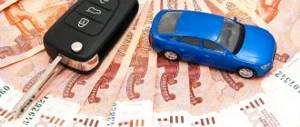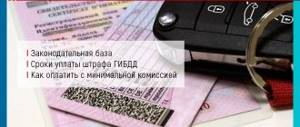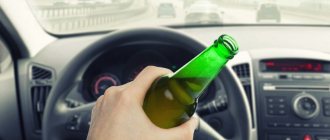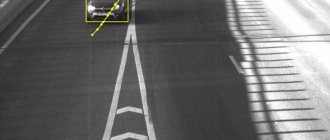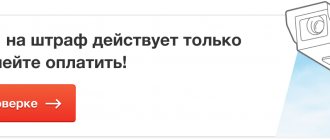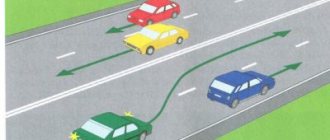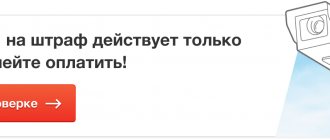AutoUrayt.rf / Questions
Back
Published: March 23, 2020
Reading time: 3 min
0
825
Surely many drivers have encountered the so-called “chain letter”. You can get it if you commit an administrative offense in relation to traffic rules (traffic rules), and automatic recording devices will register it. From this article you will learn what the consequences may be and whether it is possible to lose your license in this way, because modern technologies make it possible to track not only violations of the speed limit, but also driving through an illegal traffic light or making a U-turn across a solid line.
- Is it possible to lose your license for violations recorded by a video camera?
- Peculiarities of proceedings in cases of administrative offenses recorded by technical means operating in automatic mode
- When can you still deprive your camera rights?
- Differences between automatic photo or video recording and recording by a traffic police officer using a camera
- The most serious violations recorded by video recording systems and liability for them provided for by the Code of Administrative Offenses of the Russian Federation
- conclusions
Is it possible to lose your license for violations recorded by a video camera?
According to Russian legislation, deprivation of rights for a violation recorded by a video recording camera is impossible.
Cameras are installed on roads to detect and record the following offenses:
- driving into oncoming traffic or through a double continuous lane;
- driving in areas prohibited for cars, for example when driving in a public transport lane or pedestrian zone;
- deviation from the speed limit or passenger safety rules;
- driving at an inappropriate traffic light signal;
- parking in an unspecified place and many others.
These violations are recorded automatically using special devices. The car owner receives a notice of administrative violation, which he can appeal within ten days.
The provided video or photographic evidence cannot guarantee the absolute authenticity of the offense committed. Thanks to the development of technical means, it does not require much skill to create a fake confirmation from video cameras. Don't forget about possible malfunctions in the software installed in the tracking tools. Therefore, for a violation recorded by the automatic system, punishment is provided mainly in the form of a fine.
More on the topic: Is it possible to drive in reverse on a one-way road?
REFERENCE! For example, for violating the speed limit, the maximum penalty is 5,000 rubles, which is provided for in paragraph 5 of Article 12.9 of the Code of Administrative Offenses of the Russian Federation.
Does the presumption of innocence work?
Drivers often find themselves in a situation where they have not violated traffic rules, but they simply cannot prove their cleanliness before the law. That is, if the traffic cop assures that the driver violated any point of the rules, then the car owner cannot object to anything and provide evidence of his innocence in such a case. At the same time, it is not clear whether the presumption of innocence works in such a case and whether the driver must prove his innocence or, on the contrary, the traffic police inspector must provide evidence of the guilt of a particular driver and only then fine him.
According to current legislation, traffic police officers are considered officials who can draw up a report only on the basis of a violation they see. At the same time, a citizen’s refusal to sign the protocol indirectly proves his guilt, and in the future it will be impossible to challenge such a document. Therefore, the driver, even if he considers himself completely innocent, but a protocol is drawn up against him about one or another violation, in such a case it is necessary to sign the protocol, but indicate his disagreement with explanations in the relevant part, and subsequently go to court.
When can you still deprive your camera rights?
There are situations in which a violation recorded by a camera may result in deprivation of rights.
In addition to cameras operating in automated mode, there are also manual ones. They are used by traffic police officers.
With this option, the inspector stops the offender and gives him the opportunity to familiarize himself with the received material, which clearly shows the offense. Next, the traffic police officer draws up a protocol. The obtained data, recorded using a technical tool, must be attached to the prepared document.
More on the topic: Is it possible to drive a car if your leg or arm is broken and in a cast?
IMPORTANT! The materials themselves confirming an administrative offense in the field of traffic rules are not sufficient grounds for depriving a driver of the right to drive a car.
That is, what sanctions to apply to the violator will be decided only by the judge at the trial. Punishment is imposed solely on the basis of the protocol drawn up.
If you are faced with a situation (for example, the judge is incompetent and has a personal grudge against you) in which you have been deprived of your rights based only on video recording of the offense committed, appeal the verdict.
The application must be submitted to a higher court within 10 days from the date of the verdict. Deprivation of rights based on materials recorded on camera is illegal, so the plaintiff will be acquitted.
Grounds for confiscation of a driver's license
The presented measure is serious, and therefore does not apply to minor offenses. It is used in relation to persons who have created potentially dangerous situations.
In any case, deprivation of cell rights is carried out through the court. The most common reasons for driver's license confiscation are presented in the table below.
| Nature of the violation | Period of deprivation of rights (months) |
| Driving a vehicle with false registration plates or no registration plates at all. | 3-12 |
| Using any illegally installed sound or light signaling devices on a vehicle. | Up to 24 |
| Driving after drinking alcohol, under the influence of psychotropic substances, or medications that affect physical abilities. | 18-36 |
| Refusal to undergo an examination if the stopped driver shows signs of intoxication. | Up to 24 |
| Exceeding the permissible speed limit by more than 60 km/h | 4-6 |
| Escape from the scene of a traffic accident | 12-18 |
| Driving in the oncoming lane in violation of traffic rules | 4-6 |
| Crossing railway tracks in an unspecified place, or at excessive speed. | — |
| Obstructing emergency vehicles | Until 3 |
| Failure to comply with standards for the transportation of large cargo | 2-6 |
conclusions
Thus, a decision on infringement of rights solely on the basis of materials obtained thanks to a technical means of fixation operating in automatic mode is not objective, and therefore, it will be unlawful.
However, do not forget that the roads are patrolled by traffic police officers, who will draw up a protocol in case of violation. Further, everything will depend on the circumstances of the offense and the judge’s decision. So, you always risk losing your right to drive. In addition, do not forget that there are financial penalties for violations in the form of fines.
Can a driver's license be confiscated based on video recording?
Modern video cameras and radar systems can record offenses automatically. However, the presence of such material is not direct evidence of guilt. Therefore, when considering the question of whether rights can be deprived for a camera, it is necessary to determine how the video recording was made. A driver’s license can be confiscated only if the violation was filmed directly by a traffic police officer. In other situations, a detailed study of the conditions is required. It is prohibited to deprive rights based on materials obtained through automatic capture.
If there is no video recording of a traffic violation, is it possible to appeal the fine?
In general, a motorist has the opportunity to appeal absolutely any decision within the established time frame. However, such actions may not be successful in every situation. It all depends on the reason for the appeal. Speaking about the illegality of drawing up a resolution by a traffic police inspector, unfortunately, it is very difficult to appeal such actions.
Of course, the driver has the presumption of innocence on his side. However, every police officer took an oath. There seems to be no connection between these two concepts. But when considering a case in court, the main evidence of the driver’s guilt is considered to be the police report drawn up, no matter how absurd it may sound.
Therefore, when making a decision, the court is guided by the following basis: it is impossible not to trust the traffic police officer, since he took an oath. Accordingly, he cannot deceive. In professional judicial circles, this basis has already received its own abbreviation - there is no reason not to trust a police officer.
Should the traffic police inspector show the driver photographs or video recordings of the violation?
The more widespread and introduced technical means of photo and video recording are, the more car owners become accustomed to the fact that every violation of theirs will be recorded without fail.
Many drivers are of the opinion that if there is a recording, but the traffic inspector refuses to provide it for viewing, there was no violation. Accordingly, the traffic police inspector does not have the right to draw up a resolution to impose an administrative penalty.
This opinion is wrong. According to the rules of the administrative procedure and Article 25.1 of the Administrative Code, from the moment the traffic inspector began drawing up a report on the driver, the latter is given the right to familiarize himself with all the materials, provide an explanation and evidence of his innocence.
In addition, the administrative regulations provide for the traffic inspector to explain to the driver the essence of the traffic violation. However, not a single legislative act stipulates that a traffic police officer is obliged to show the driver a photo or video of the violation.
In addition, the Administrative Code contains article number 26.1. It states that when considering an administrative case, any factual data that will become the basis for establishing the driver’s guilt can be used as evidence of traffic violations. That is, the traffic police officer has the right to prove a violation on the part of the driver with his own testimony or testimony of witnesses, and not just video from the camera.
If the proceedings go to court, then the motorist has every right to familiarize himself with the case materials. But on the spot, when drawing up a protocol, a traffic police officer may refuse him and not show the video from the scene of the violation.
If the sanctions for a violation include deprivation of a driver’s license, then the duties of the traffic police inspector include only drawing up a protocol. Such cases are considered only by the court, where the traffic inspector provides the compiled documentation containing the circumstances of the violation.
The traffic police inspector must attach evidence of guilt to the list of documents or make a note about their presence in the protocol. If the driver does not agree with the violation, then he must indicate this in the protocol, which must be drawn up in accordance with Part 2 of Art. 28.6 Code of Administrative Offenses of the Russian Federation. Such actions will significantly help during the appeal.
Responsibility for driving through a red traffic light
The level of responsibility of drivers for driving through a red light is established by the three-part article of the Code of Administrative Offenses of the Russian Federation numbered 12.12. Let's take a closer look at its parts.
Its first part establishes the extent of responsibility that drivers who continue driving despite a red light or a traffic controller’s prohibiting gesture will bear.
Fine for driving through a red light. How to check the traffic police fine online, read here.
Find out what the fine is for a red traffic light at the link:
Such drivers will have to replenish the state treasury by 1 thousand rubles. Exceptions to this part are cases falling under the second part of this article, as well as the first part of Article 12.10. Code of Administrative Offenses of the Russian Federation.
The second part establishes punishment for drivers who were careless to move beyond the stop line indicated by the corresponding sign or element of road markings.
The penalty for this part is slightly less than for the previous one, and amounts to 800 rubles.
The third part establishes liability for drivers who, during the calendar year, have repeatedly driven through a red light, or under the prohibitory gesture of a traffic police inspector.
Repeatedly caught drivers will have to replenish the state budget by 5 thousand rubles, or spend the next four to six months without a license.
Upon careful study of paragraphs 6.2 and 6.3 of the traffic rules, it becomes obvious that any movement of a vehicle in the event of a prohibitory traffic light signal, or with a combination of yellow and red lights, is unacceptable.
In addition, driving on a yellow light is also an offense, except for the cases specified in paragraph 6.14 of the traffic rules. This clause allows you to continue driving on a yellow light if it is impossible to stop the movement without applying emergency braking.
Thus, if a prohibitory traffic light is on or the traffic police inspector makes the appropriate gesture, then you are committing an illegal act.
The punishment for committing it is established in the above-mentioned Article 12.12 of the Code of Administrative Offenses of the Russian Federation. Moreover, in this article, penalties do not have a lower or higher limit; they are firmly established.
The second part of Article 12.12 establishes separate liability for crossing the stop line in the amount of 800 rubles.
Cases such as failure to stop in front of a railway crossing, in front of an intersecting roadway and a number of others are also qualified as running a red light and are punished in accordance with part one of Article 12.12 of the Code of Administrative Offenses of the Russian Federation, that is, you will have to pay a fine of 1 thousand. rub.
It is worth noting that if you continue driving through a red light, you will be held liable under the first part of Article 12.12 of the Code of Administrative Offenses of the Russian Federation.
But if the corresponding stop line markings were placed on the highway, then in addition to liability under the first part, the traffic police officer may hold you accountable under the second part of Article 12.12. Thus, the amount of penalties for you will be 1800 rubles.
If this is a repeat violation, then the fines increase to 5 thousand rubles. and the threat of being left without a license for up to 6 months becomes real.



